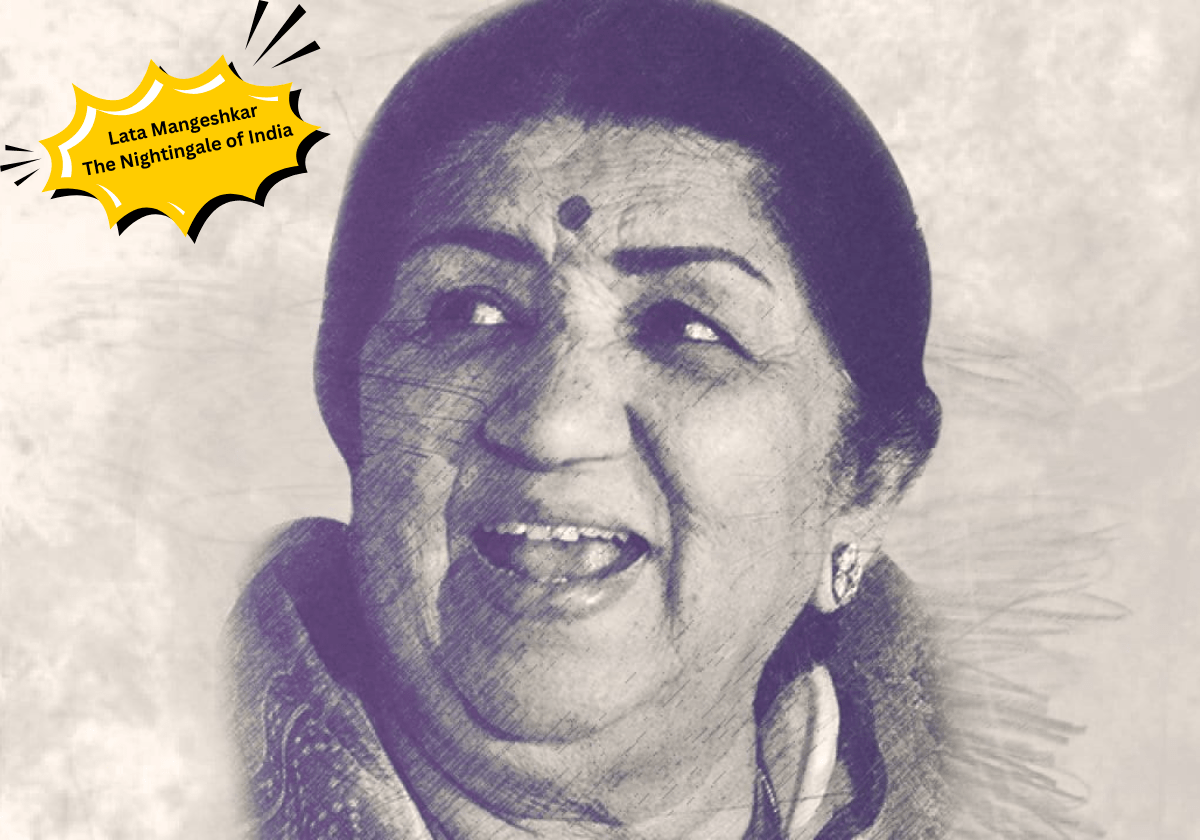Lata Mangeshkar: Early Life and Family Background
Lata Mangeshkar Focused On Earning For Her Family With A Career In Singing At 13. Lata was born on September 28 of the year 1929, in the city of Indore, Madhya Pradesh. The family that Lata was born into was actively involved with music, her father being a praiseworthy classical singer along with being a theatre actor, her father was singularly responsible for shaping Lata’s musical instincts. Her Mother also helped propel the musical culture that the family possessed. Is it any surprise Lata was the oldest of five, and all the other four – Asha Bhosle, Usha Mangeshkar, Meena Mangeshkar, and Hridaynath Mangeshkar, also made it big in the music industry? Music Industry
A Part of the Mangeshkar family’s music-related biography includes classical music, ragas, bhajans and more. All this started from a young age, all thanks to her father, she played a crucial role in moulding the sensational singer that Lata went on to become. However, everything changed when she turned 13 and her father passed away, forcing her to provide for her family at a young age.
Lata Mangeshkar: Musical Journey and Breakthrough
Lata began recording songs for Marathi movies and appeared in some of them to provide for her family before transitioning. After her father’s passing, Master Vinayak, a filmmaker and close acquaintance of Lata’s, assisted her with her struggles. But with her spectacular voice came the majestic “Aayega aane wala” song from the movie Mahal which launched her into fame overnight.
Suddenly, Lata found herself as the most sought-after playback singer in the Bollywood swamp. She was unable to sing for more than a couple of actresses because of her unique singing capabilities. When working with classic music composers such as Shankar Jaikishan, Naushad, S.D. Burman and Madan Mohan, became a trendsetter for many hit songs back in those days.
Lata Mangeshkar: Career Highlights and Iconic Songs
Extensive Work in Indian Cinema
Lata Mangeshkar’s life work extended for nearly seventy long years during which she participated in over a thousand Hindi films and recorded songs in more than 36 languages such as Marathi, Bengali, Tamil and Gujarati. She was trained in a melange of styles which included classical tunes, romantic adulations, and devotional phrases.
Famous Songs
Few songs are closer to Lata’s heart than her other songs, including this largely popular selection of Indian cinema that someone who hasn’t watched the film can sing in Asha Bhosle’s melodious rendition – let alone watch the film.
- The film’s signature tune “Lag Ja Gale” (Woh Kaun Thi) released in 1964
- Ajeeb Dastan Hai Yeh in Dil Apna Aur Preet Parai 1960
- Mughal-E-Azam’s “Pyar Kiya Toh Darna Kya” in 1960
- Aandhi’s “Tere Bina Zindagi Se Koi” released in 1975
This song has a softer side too, as it is widely known that soon after performing it Akbar Delhi broke into tears while listening to her performance during the 1963 show.
Her voice was of utmost importance at the dawn of Hindi cinema’s golden age where she was recognized for grace, beauty, and perfectly mastered singing.
Lata Mangeshkar: Awards and Achievements
Lata Mangeshkar’s extraordinary contribution to music earned her numerous prestigious awards and honours. Some of the most significant recognitions include:
- Bharat Ratna (2001) – India’s highest civilian award, recognizing her unparalleled contribution to Indian music.
- Dadasaheb Phalke Award (1989) – For lifetime achievement in Indian cinema.
- Padma Bhushan (1969) and Padma Vibhushan (1999) – Prestigious civilian honours for her excellence in music.
- Multiple National Film Awards for Best Female Playback Singer.
- Filmfare Awards – Lata received several Filmfare Awards and was later honoured with the Filmfare Lifetime Achievement Award.
She also received honorary doctorates from several universities and international recognition for her impact on world music.
Lata Mangeshkar: Personal Life and Principles
Lata Mangeshkar once remarked, “Musical notes do not mean figments of imagination, they represent God.” This quite clearly epitomizes her dedication to a life of chastity. Possessed by God’s love for music, she paid little attention to the other aspects of life and never bothered to marry. Spending her life in music was always her prime aim. While being at the peak of her fame due to her numerous songs, Lata’s inborn moderate nature and simplicity resulted in her maintaining discretion about many areas of her life, answering in a completely disciplined and hard-working manner through her approach towards her art.
As a supporter of social causes, Lata was also quite well known for her charity work like giving out scholarships to eager new artists and holding charitable events during which money could be raised.
Lata Mangeshkar: Legacy and Influence
Lata Mangeshkar is the epitome of incomparability when it comes to Indian music not just in its entirety but even in the individual aspects/listeners. Lata’s voice alone is more than enough to pour validation over what an era of “playback singing” brought for India’s music industry, it stood as a witness to the greater amalgamation of music and art by the country. If anyone claims to be a singer nowadays, I am positive that one of her songs would have been closely studied by them whether it be her contemporaries or modern-day singers. Right this moment some songs have been put in a modern good noise which need not be proved due to her creative spine lining being behind them.
We look up to Lata as a beacon of hope, she had given wings to women who were not allowed to explore the world of fancy music which in those days was dominated by only men. Her life and journey up to date still broke glass ceilings in terms of fearlessly crushing the scepticism that surrounded the music industry in India.
Lata Mangeshkar: Passing and Tributes
Lata Mangeshkar, the Nightingale of India, took her last breath on 6 February 2022 due to a multi-organ failure. The news of her death came as a blow to the Indian economy as she had brought them a lot of wealth with her singing career. Global tributes began to enter upon her demise, and her nation declared two days of national mourning. Even the head of state addressed her as an icon who had revolutionised the Indian music industry.
She’s embedded in history, and history can never be erased. Her reputation still lives on through her several songs and interviews, and today countless Indians can safely say her name without being doubted.

